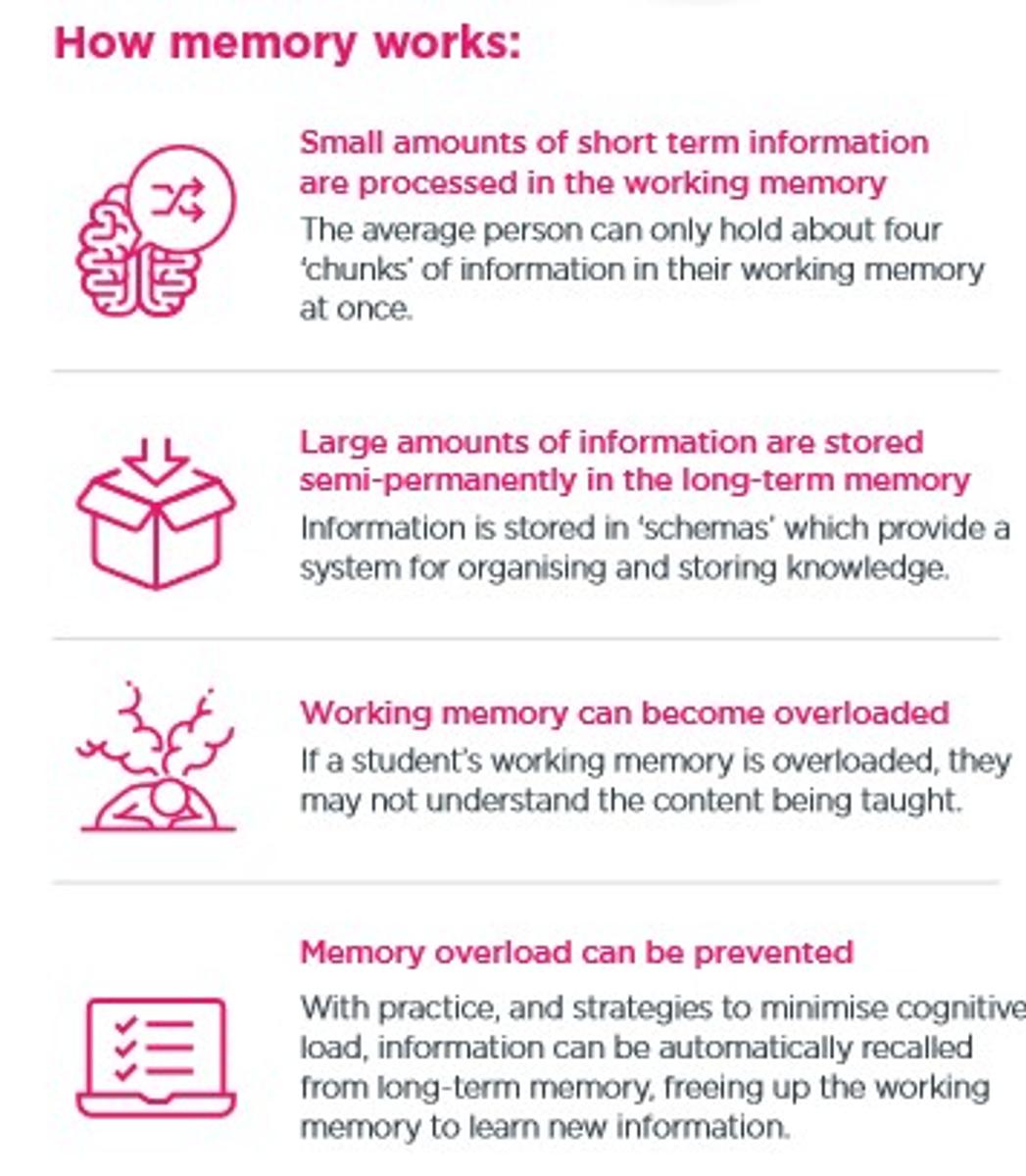Deputy Principal, Teaching and Learning

Do you know how the brain works?
We often make assumptions that we understand how this complex organ works. The brain is fascinating. Dylan William’s research highlights the importance of understanding not just what we ‘learn’ and put into our brain, but how much information and when. He has described cognitive load theory as ‘the single most important thing for teachers to know’. Grounded in a robust evidence base, cognitive load theory provides support for explicit models of instruction.
The human brain can only process a small amount of new information at once, but it can process very large amounts of stored information.
Information is processed in the working memory, where small amounts of information are stored for a very short time. The average person can only hold about four ‘chunks’ of information in their working memory at one time.
Long-term memory is where large amounts of information are stored semi-permanently. Information is stored in the long-term memory in ‘schemas’, which provide a system for organising and storing knowledge.
If a student’s working memory is overloaded, there is a risk that they will not understand the content being taught and that their learning will be slow and/or ineffective. With extensive practice, information can be automatically recalled from long-term memory with minimal conscious effort. This ‘automation’ reduces the burden on working memory, because when information can be accessed automatically, the working memory is freed up to learn new information.
Cognitive load theory indicates that when teaching students new content and skills, teachers are more effective when they provide explicit guidance accompanied by practice and feedback, not when they require students to discover for themselves many aspects of what they must learn.
Research from cognitive load theory has produced several instructional techniques that are directly transferable to the classroom. These include the ‘worked example effect’, which is the widely replicated finding that novice learners who are given worked examples to study perform better on subsequent tests than learners who are required to solve the equivalent problems themselves. As a teacher it is the ‘I do, we do you do’ that supports student learning.
These ideas transfer to the way a student prepares for a test or exam. Revision must be planned and requires students to revise small amounts at a time. Consider creating a glossary of key terms and using flashcards to test your knowledge. If these ideas have sparked your interest, why not find out more by reading about Cognitive Load Theory or discussing this with your child’s teacher.
Information from www.cese.nsw.gov.au
Important Dates Week 4:
- All week: Year 11 2022 Subject Selection Interviews
- EXPLORE Information Night: Wednesday
- Mini EXPLORE Expo: Thursday lunchtime
Susan Bradbeer
Deputy Principal of Teaching and Learning
VCE Assessment & GAT Preparation
GAT – Thursday 12 August – 10am to 1.15pm
All students sitting the GAT (students taking a scored Unit 3&4 subject) should by now have received from their mentor the 2021 VCAA GAT and Examination Navigator. If you still need a copy, please see me for a replacement copy.
I will run a GAT information session to provide an update on the latest requirements. Please meet promptly in the Simons Auditorium on Tuesday 10 August at 8.45am.
Students studying VCE Unit 3&4 subjects are currently experiencing a heavy workload of assessments as courses are readjusted due the recent lockdown. Below are five tips to help you manage through the remainder of the term.
Managing The Workload
- Make a to-do list – prioritise your tasks and take pleasure in crossing them off.
- Don’t procrastinate – try the first 10 questions, try to keep writing for 10 minutes, once you get started it is much easier to keep going.
- Be organised – keep track of rescheduled assessments and deadlines, prioritise your commitments.
- Take short breaks – reward yourself with time out for exercise or a cuddle with your pets.
- Study groups – share ideas with others in your class, bounce ideas off each other, motivate one another.
VCE Subject Selection
I have had the pleasure of meeting with Year 10 students, Year 11 students and their families recently to discuss subject selections for their VCE pathway over the next 1 to 2 years. I love to see the passion students have when asked what they love to learn and what they can see themselves doing in the future. I look forward to working with you over the coming months to create a balanced and rewarding selection of subjects to achieve your VCE Certificate.
Mrs Rebekah Bonnett
Head of VCE Studies & Head of Science

